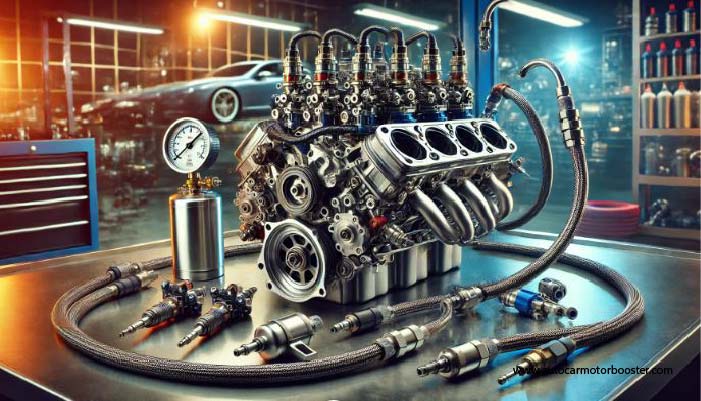Boosting your car’s performance is an exciting venture, but without the right fuel system upgrades, it can lead to engine inefficiency or even damage. The fuel system is the lifeline of any performance vehicle, ensuring optimal fuel delivery to meet the demands of increased power. This article explores the necessary upgrades for your fuel system to support boosted applications effectively.
Understanding the Importance of Fuel System Upgrades
Boosting, whether through turbocharging or supercharging, significantly increases the air entering the engine. To maintain the proper air-to-fuel ratio, the fuel delivery system must be capable of supplying enough fuel. If this system isn’t upgraded, it can lead to lean conditions, detonation, or engine failure. Fuel injectors, fuel pumps, and fuel pressure regulators play critical roles in achieving the desired performance without compromising engine safety.
Essential Components of a Fuel System Upgrade
To support boosted applications, you’ll need to evaluate and potentially upgrade the following components:
- Fuel Injectors
High-performance injectors are essential for delivering the increased fuel required under boost. Upgraded injectors can handle the increased flow rates, ensuring the engine maintains the proper air-to-fuel ratio. - Fuel Pumps
The stock fuel pump may struggle to supply the required fuel pressure and volume under boost. Installing a high-capacity in-tank or external fuel pump is necessary for consistent fuel delivery. - Fuel Lines and Fittings
Boosted applications demand robust fuel lines that can handle higher pressures. Upgraded braided steel lines or PTFE fuel lines provide durability and prevent leaks. - Fuel Pressure Regulators
A reliable fuel pressure regulator ensures stable fuel pressure across the engine’s RPM range. Adjustable regulators allow fine-tuning to match the specific needs of a boosted engine. - Fuel Filters
An upgraded fuel filter keeps contaminants out of the system and supports the increased fuel flow required by the pump and injectors.
Steps to Upgrade Your Fuel System
- Assess Your Vehicle’s Current Fuel System
Begin with a thorough inspection of your existing fuel system. Identify components that may need upgrading based on the level of boost you plan to apply. - Calculate Fuel Requirements
Use a fuel injector calculator to determine the required flow rate based on your engine’s horsepower and boost level. This helps in selecting appropriately rated injectors and pumps. - Install High-Performance Components
Replace outdated components with performance-grade alternatives. Ensure compatibility between components to avoid performance bottlenecks. - Tune the Engine
A proper ECU (Engine Control Unit) tune is crucial after upgrading the fuel system. It ensures optimal performance, efficiency, and safety under boosted conditions.
Benefits of a Proper Fuel System Upgrade
- Improved Engine Performance: Ensures the engine operates at peak efficiency under high loads.
- Enhanced Durability: Prevents damage due to lean conditions or insufficient fuel delivery.
- Customizability: Allows fine-tuning for specific power goals.
- Safety: Reduces the risk of engine failure during demanding operations.
FAQs About Fuel System Upgrades for Boosting
1. Why is upgrading the fuel pump important for boosting?
Upgrading the fuel pump ensures it can supply the necessary fuel volume and pressure to meet the increased demands of a boosted engine.
2. Can I use stock fuel injectors with a boosted setup?
Stock injectors may not provide the flow rate required for boosted applications, leading to poor performance or engine damage.
3. How do I know if my fuel system is insufficient for boosting?
Signs include fuel starvation, engine knocking, or the inability to maintain the desired air-to-fuel ratio under boost.
4. What is the role of a fuel pressure regulator in a boosted engine?
A fuel pressure regulator maintains consistent fuel pressure, preventing lean or rich conditions during varying boost levels.
5. Is it necessary to retune the ECU after upgrading the fuel system?
Yes, retuning is essential to optimize performance, adjust fuel maps, and ensure the engine runs safely with the upgraded components.
Conclusion
Fuel system upgrades are crucial for supporting the demands of boosted engines. By addressing critical components such as fuel injectors, pumps, lines, and regulators, you can achieve optimal performance, reliability, and safety. Always work with professionals or consult a tuner to ensure your upgrades are tailored to your specific setup.
If Like This Article Visit Our Website. Collect From Wekiapedia
